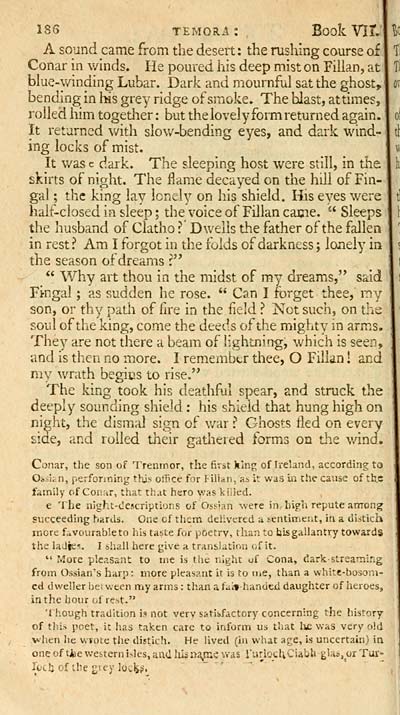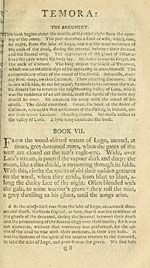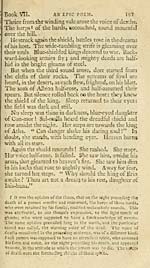Download files
Complete book:
Individual page:
Thumbnail gallery: Grid view | List view

1S5 temora: , BookVir.
A sound came from the desert: the rushing course oi
Conar in \yhids. He poured his deep mist on Fillan, at
blue-y/inding Lubar. Dark and mournful sat the ghost,
bending in l>is grey ridge of sraoke. The blast, at time; ,
rolled him together: but thelovelyform returned again.
It returned with slow-bending eyes, and dark wind-
ing locks of mist.
It v/as c dark. The sleeping host were still, in the
skirts of night. The flame decayed on the hill of Fin-
gal ; the king lay lonely on his shield. His eyes were
half-closed in sleep ; the voice of Fillan came. " Sleeps
the husband of Clatho : Dwells the father of the fallen
in rest? Am I forgot in the folds of darkness ; lonely m
the season of dreams ?"
" Why art thou in the midst of my dreams," said
Fingal ; as sudden he rose. " Can I forget thee, my
son, or thy path of fire in the field ? Kot such, on the
soul of the king, come the deeds of the mighty m arms.
They are not there a beam of lightning, which is seen,
and is then no more. I remember thee, O Fillan ! and
my wrath begins to rise."
The king took his deathful spear, and struck the
deeply sounding shield : his shield that hung high on
night, the dismal sign of war ? Ghosts fled on every
side, and rolled their gadiered forms oa the wind,
Conar, the son of Treninor, the first king of Ireland, according to
Oiiiin, performing this office for tiliaii, ab it was ia Che cause of th.e
family of Conar, that that hero was kilied.
e The night-descriptions of Ossian were in, liigh repute among
succeeding hards. One of tliem delivered a sentiment, in a distich
more favourable to his taste for poetry, than to bis gallantry towards
the ladre*;. I shall here give a translation of it.
" More pleasant to tne is the night of Cona, darkstreami.^g
from Ossian's harp : more pleasant it is to tne, than a whitc-bosom-
cd dweller between my arms: than a faifhanded daughter of lieroes,
in the hour of rest."
Though tradition is not very satisfactory concerning the history
of this poet, it has taken care to inform us that lie was very old
v'hen lie wrote tlie distich. He lived (in what age, is uncertain) in
one of tke western i>les, and hii i>a;r.e vras I'lirlocU Ciabh ^Us,^or Tur-
I'tcHj of the grey loilj^.
A sound came from the desert: the rushing course oi
Conar in \yhids. He poured his deep mist on Fillan, at
blue-y/inding Lubar. Dark and mournful sat the ghost,
bending in l>is grey ridge of sraoke. The blast, at time; ,
rolled him together: but thelovelyform returned again.
It returned with slow-bending eyes, and dark wind-
ing locks of mist.
It v/as c dark. The sleeping host were still, in the
skirts of night. The flame decayed on the hill of Fin-
gal ; the king lay lonely on his shield. His eyes were
half-closed in sleep ; the voice of Fillan came. " Sleeps
the husband of Clatho : Dwells the father of the fallen
in rest? Am I forgot in the folds of darkness ; lonely m
the season of dreams ?"
" Why art thou in the midst of my dreams," said
Fingal ; as sudden he rose. " Can I forget thee, my
son, or thy path of fire in the field ? Kot such, on the
soul of the king, come the deeds of the mighty m arms.
They are not there a beam of lightning, which is seen,
and is then no more. I remember thee, O Fillan ! and
my wrath begins to rise."
The king took his deathful spear, and struck the
deeply sounding shield : his shield that hung high on
night, the dismal sign of war ? Ghosts fled on every
side, and rolled their gadiered forms oa the wind,
Conar, the son of Treninor, the first king of Ireland, according to
Oiiiin, performing this office for tiliaii, ab it was ia Che cause of th.e
family of Conar, that that hero was kilied.
e The night-descriptions of Ossian were in, liigh repute among
succeeding hards. One of tliem delivered a sentiment, in a distich
more favourable to his taste for poetry, than to bis gallantry towards
the ladre*;. I shall here give a translation of it.
" More pleasant to tne is the night of Cona, darkstreami.^g
from Ossian's harp : more pleasant it is to tne, than a whitc-bosom-
cd dweller between my arms: than a faifhanded daughter of lieroes,
in the hour of rest."
Though tradition is not very satisfactory concerning the history
of this poet, it has taken care to inform us that lie was very old
v'hen lie wrote tlie distich. He lived (in what age, is uncertain) in
one of tke western i>les, and hii i>a;r.e vras I'lirlocU Ciabh ^Us,^or Tur-
I'tcHj of the grey loilj^.
Set display mode to: Large image | Transcription
Images and transcriptions on this page, including medium image downloads, may be used under the Creative Commons Attribution 4.0 International Licence unless otherwise stated. ![]()
| Early Gaelic Book Collections > Ossian Collection > Poems of Ossian, the son of Fingal > Volume 2 > (196) |
|---|
| Permanent URL | https://digital.nls.uk/77915061 |
|---|
| Shelfmark | Oss.54 |
|---|---|
| Attribution and copyright: |
|
| Description | Selected books from the Ossian Collection of 327 volumes, originally assembled by J. Norman Methven of Perth. Different editions and translations of James MacPherson's epic poem 'Ossian', some with a map of the 'Kingdom of Connor'. Also secondary material relating to Ossianic poetry and the Ossian controversy. |
|---|
| Description | Selected items from five 'Special and Named Printed Collections'. Includes books in Gaelic and other Celtic languages, works about the Gaels, their languages, literature, culture and history. |
|---|

